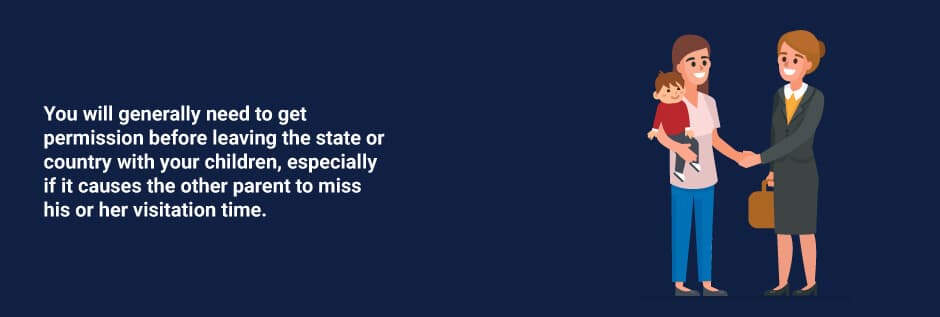Child Custody: Moving the Kids to a Different State

In our increasingly global economy, relocation has become a fact of life. In fact, America is one of the most mobile countries in the world. According to a Gallup study, approximately one-fifth of Americans have moved to another area or a different state within the last five years.
What’s the biggest reason Americans move? Work. Imagine you have a great new career opportunity out of state or your company transfers you to another region. If you’re single or in an intact marriage, packing up your family and home is straightforward enough. But if you’re divorced with kids—that’s when it gets tricky.
When A Parent Wants to Move to a Different State with the Kids

First things first. If you are divorced, it is illegal to move your children to a different state without first obtaining permission from the other parent or a judge.
If you are still married, you are legally allowed to move the children to a different state without permission, but tread carefully as it may affect your custody rights later on.
If you and the other parent were never married, there is no legal requirement to obtain permission. However, speak with an attorney to see if it might be a good idea to obtain permission anyways due to the law or uncertainty with what the other parent might do.
When Parents Live in Different States

If your children weren’t born in Massachusetts or the other parent lives in a different state, custody modifications can get tricky. In some cases, Massachusetts courts can modify out of state custody orders. Note that the child must have been living in Massachusetts for a minimum of six months in order for Massachusetts courts to have jurisdiction. In these complex multi-state cases, it is advisable to consult with an experienced family law attorney.
Traveling to a Different State or Country with Children

You will generally need to get permission before leaving the state or country with your children, especially if it causes the other parent to miss his or her parenting and visitation time. If your child custody order restricts travel, you will have to obtain a court order to travel. Be sure to carry this court order with you at all times. You may need to show it to officials throughout your trip, including airport staff, customs, and border patrol.
How to Get Permission from a Judge

For the court to grant one parent permission to move to a different state with a child, the parent must prove two things. The first thing to prove is that there is a real advantage to the move. Some examples of real advantages are a better job or closer proximity to grandparents.
The second thing to prove is that the move is in the child’s best interests. If the move will undermine the child’s relationship with the other parents or negatively affect the child’s emotional, physical, or developmental needs, the court may deny the request.
What Happens When the Court Denies a Move?

If it is determined that an out-of-state move will have a negative impact on your children, the judge may deny the move. Some parents might be tempted to take the kids and relocate anyway. You should not do this as it would be kidnapping and you might be subject to prosecution and imprisonment. We strongly suggest that parents obey the court order.
A custodial parent who relocates a minor child without permission from the noncustodial parent and the court could be found in contempt. The punishments are serious: they could include fines and jail time. In certain cases, the court may even revoke child custody, awarding it to the other parent.
A Special Case: Domestic Violence

If you are a victim of domestic violence, your safety and the safety of your children may depend on your ability to leave the state quickly. In these unfortunate cases, you should still consult with an attorney if at all possible. You may be able to file a temporary restraining order that will grant you custody and permission to leave the state.
Work with An Experienced Family Attorney

As a parent, protecting your children’s best interests is your top priority. At Infinity Law Group, it’s ours as well. We focus on what is best for you and your children and work hard to help you get the results you want. If you’re a Massachusetts resident and thinking about moving to a different state after your divorce, consult with the experienced family attorneys at Infinity Law Group.
 Infinity Law Group LLC
Infinity Law Group LLC





